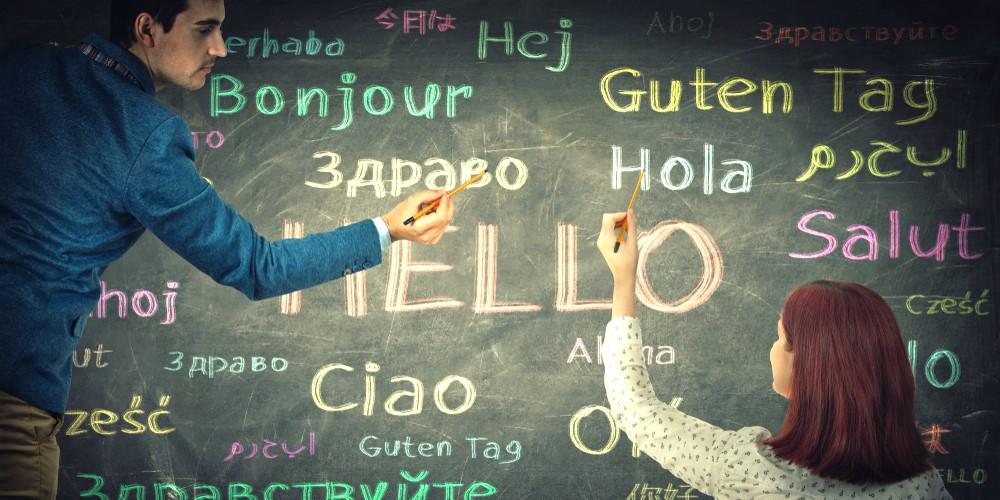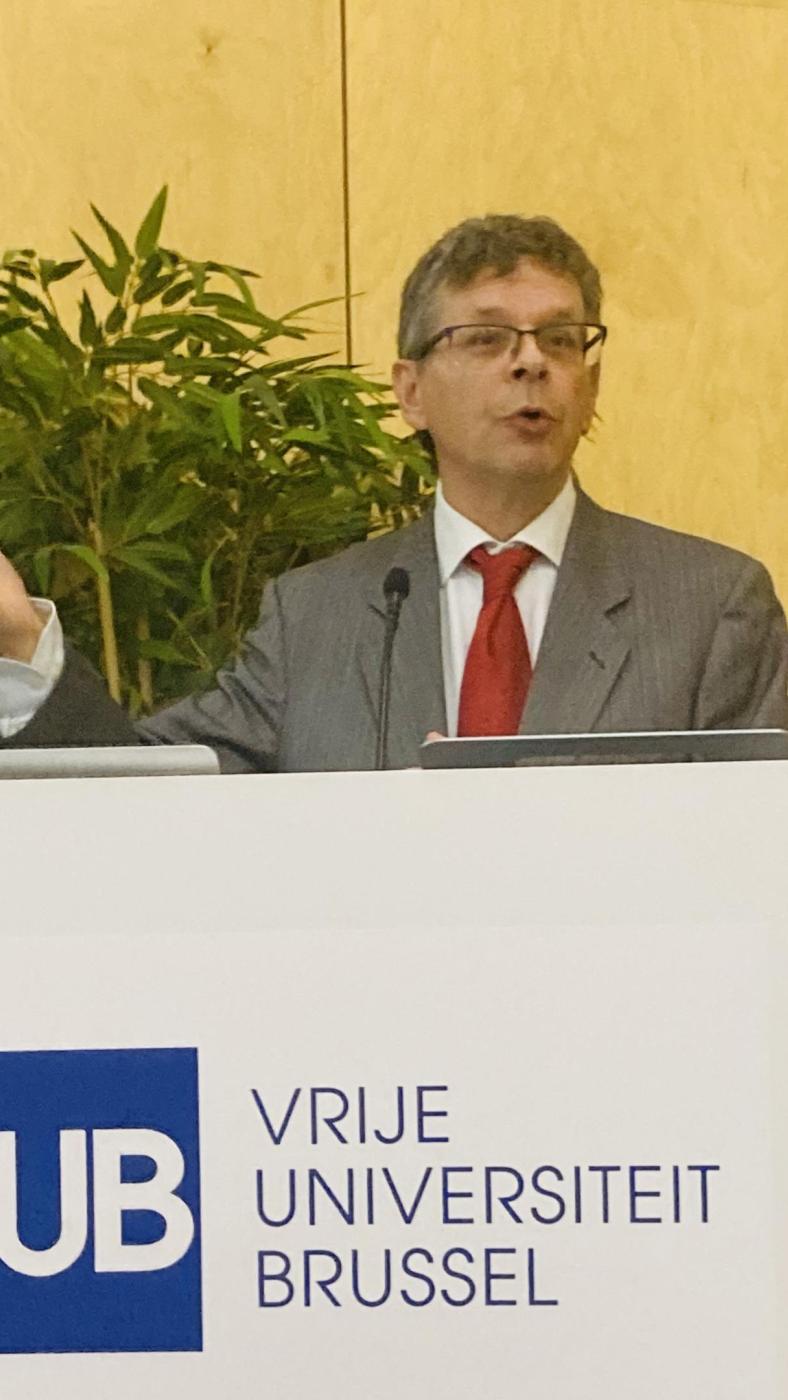
Professor and VUB alumnus Jean-Marc Dewaele, world authority in multilingualism research and holder of the prestigious International Francqui Chair, recently visited the VUB. In a lecture on the sense and nonsense of multilingualism, he highlighted its cognitive, socio-economic and even biological benefits. Speaking to VUB Today, Dewaele explains how his bilingual upbringing shaped his ideas, what multilingualism does to our identity and why learning a new language remains indispensable even in the age of translation apps. ‘Language is intertwined with our identity, culture and even our brain.’
Professor Jean-Marc Dewaele is a man with a passion for language. His research dives deep into the psychology and social dynamics of multilingualism, and at the Free University of Brussels he shares those insights as holder of the International Francqui Chair. Our e-mail exchange to fix the arrangements for the interview took place in English. In international traffic, this is actually a matter of course, even if you speak the same mother tongue. ‘It shows how automatic language choices can be,’ says Dewaele. ‘We choose a language not only to communicate, but also to fit a certain context. It's something I often think about in my own life as well as in my research.’
Professor Dewaele, before we begin, what language are we speaking today? You were brought up bilingual, right?
‘Yes, that's right. Let's do it in Dutch. My parents spoke French with us at home, but at school I learnt Dutch. That was a conscious decision by my parents, who believed that multilingualism would be an advantage in life. But honestly? As a child, I didn't understand that. Why did we have to speak French at home, while all my classmates in Bruges spoke dialect with their parents? I felt different. And sometimes I felt like I was missing something, because I never learnt the local dialect. To this day, I don't speak West Flemish, although I understand it just fine.
My parents, who spoke four and three languages themselves, made me curious about languages and cultures. They had even lived in America for a year when I was a baby. Our family was truly multilingual: Dutch at school, French at home and English in contact with the world. That natural mix made me aware of how language is intertwined with identity and how you can switch gears with it.’
Did that bilingual upbringing influence your academic career?
‘Absolutely! Although it's hard to say exactly how, because to prove that scientifically, I would have to live my life all over again, but as a monolingual. (laughs) What I do know is that this multilingual environment made me sensitive to the power and complexity of language. When I started studying Romance languages at a Flemish university, I noticed how flexible we are as multilinguals. In class we spoke French, in the corridor Dutch. Until we got angry looks from fellow students: ‘Why don't they speak French over there?’ And then we switched effortlessly. That ease is typically Belgian and shows how language can connect, but sometimes also cause friction.’

Jean-Marc Dewaele
"Your own mother tongue always feels more intense because it is intertwined with your upbringing and memories"
You are also fascinated by swearing. Why is that?
‘Swearing says a lot about culture and emotions. Did you know that it is much easier to curse in a foreign language? In Dutch, you might use a forceful term like ‘godverdomme’ once in a while, but it feels less heavy when you do it in another language. That's because you don't know the emotional history of that word in a foreign language. A Dutchman who says ‘fuck’ in English will feel the taboo much less than a Briton. You have never been reprimanded for that word in class, you have no guilt about it. And that makes it interesting: swearing shows how emotionally attached we are to our language. Your own mother tongue always feels more intense, because it is intertwined with your upbringing and memories.’
There used to be a lot of fear about multilingualism. People even believed it could cause schizophrenia. How do you view that?
‘That's right. In the 1970s and 1980s, there were persistent myths about multilingualism. Some researchers claimed it could cause cognitive problems or confuse children. Today, we know that is nonsense. Multilingualism is not a danger, it is an enrichment. Those myths often stem from fear or nationalistic ideas. Some politicians still use them to promote monolingualism. Fortunately, today there is enough scientific evidence to show that multilingualism actually offers many advantages, both economically and cognitively.’
Does the language you speak affect your personality?
‘Definitely, although it depends on the context. I conducted research with 1,500 multilingual people worldwide. 85% of them said they felt different when they switched languages. That's not because you become a completely different person, but language activates memories and cultural behaviours associated with that language. I remember a fascinating experiment with Greek-American multilinguals. They had to pass judgement on a little story: a young man worked hard to earn money for his mother, but she complained that she saw him little. When they answered the question in Greek, they thought he should spend more time with his mother. In English, they said, ‘He does what he can, he needs to work.’ The same story, but a different language brought out different cultural norms. Language is more than words; it is a lens through which you view the world.’
What do you think are the main benefits of multilingualism?
‘There are so many! Multilinguals often earn more in their careers, especially in countries like the US. Cognitively, multilingualism helps keep your brain flexible. There is also evidence that multilinguals are less likely to develop dementia later in life. This is because your brain has to constantly switch between languages, which acts as a kind of brain training.
What I find really fascinating is how multilingualism changes the structure of your brain. Multilinguals have more grey and white matter in the subcortical regions of their brains. But what is even more interesting: in quadilinguals, the brain has become more efficient. They need less to achieve more. It is as if the brain is optimising itself.
And then there are the psychological benefits. Multilinguals tend to have more empathy, are more flexible in their thinking and tolerate ambiguity better. Multilingualism gives you the chance to see your own culture from a new perspective. That is perhaps the greatest gift.’
"Multilingualism is not a luxury, it is a window on the world"
Isn't learning a new language made redundant by translation apps and AI?
‘You would think so, but those technologies are missing something fundamental: culture. Translation apps can translate words, but not the rich nuances and context that come with a language. Learning a language is more than grammar or vocabulary; it is a way to really understand a culture. This is where I often see it going wrong in education. We put too much emphasis on grammar and spelling, when we should be getting students excited about the culture behind a language. For example, look at the interest in Korean, fuelled in part by K-pop and Korean drama series. People discover it through music or film and get inspired to learn the language. That cultural connection is the real power of language.’
Finally, how does it feel to be back at VUB?
‘It feels good, although it takes getting used to. The VUB will always have a special place in my heart. It is a university where languages and cultures come together, just like in Brussels itself. One of the things that struck me is how English is woven into the Dutch of Brussels youngsters these days. Thirty years ago, this was unthinkable. It shows how language is constantly evolving.’
Bio Jean-Marc Dewaele
Prof Jean-Marc Dewaele is a distinguished professor emeritus of applied linguistics and multilingualism at Birkbeck, University of London. He studied at the VUB and obtained his PhD in Romance languages there in 1993. His research is interdisciplinary and situated at the intersection of applied linguistics, sociolinguistics, sociopragmatics, social psychology and cultural psychology. In 2024-2025, on the recommendation of the VUB, he was awarded the International Francqui Professor Chair, in recognition of his contributions to the field of multilingualism.